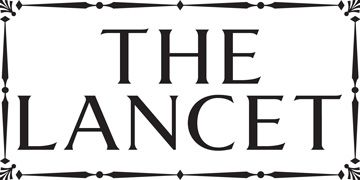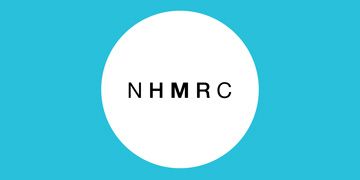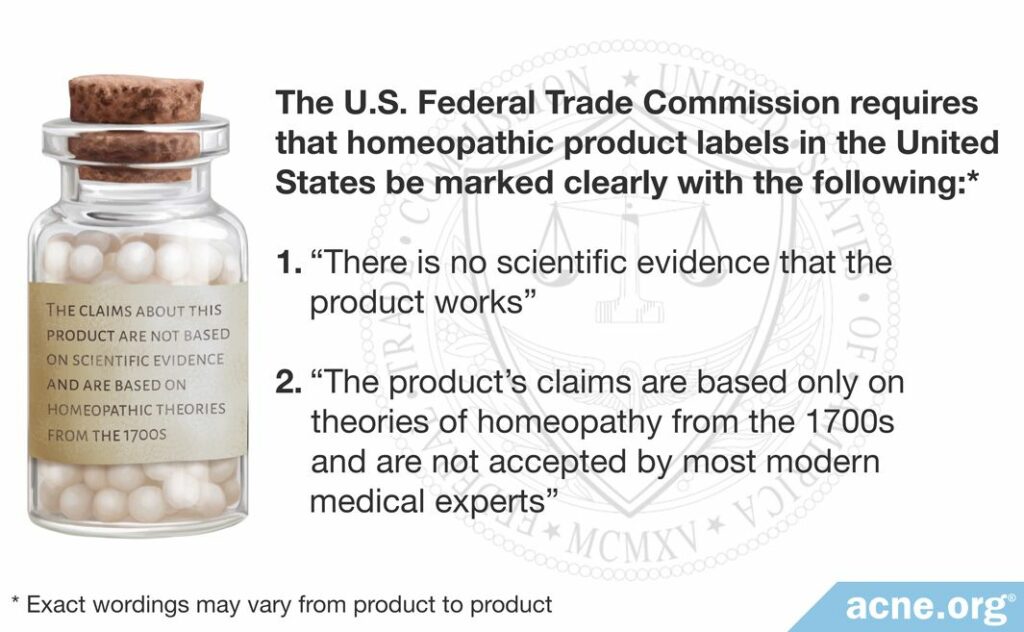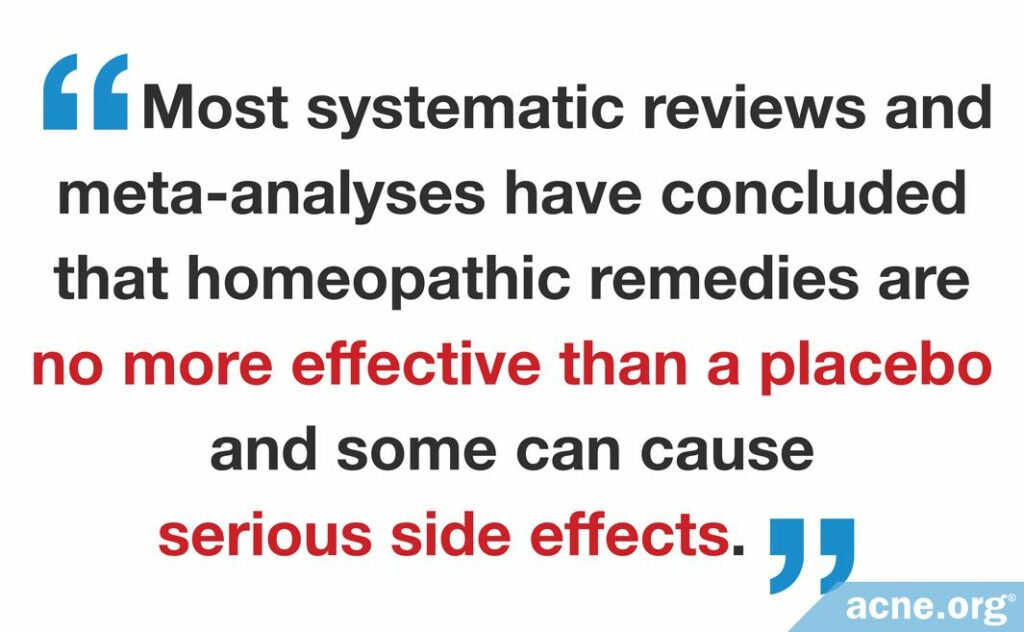Homeopathy Is an Unproven Form of Alternative “Medicine” with No Scientific Backing. Buyer Beware!

The Essential Info
Homeopathic remedies normally contain little to no active ingredient, and are based on ideas that “like cures like” and “the lower the dose of medication, the better it works.”
These ideas defy common sense, and not surprisingly, evidence has mounted showing that homeopathic remedies work no better than placebo and should not replace conventional treatments.
In other words, don’t get swindled!

The Science
- Does Homeopathy Work?
- Regulations for Homeopathic Products
- Are Homeopathic Treatments Safe?
- What about Homeopathic Treatments for Acne?
- Summary
Homeopathy is an alternative system of medical treatments that was invented by the German physician Samuel Christian Hahnemann in the late 1700s. It is based on two unconventional theories.
- The theory that “like cures like.” This theory proposes that disease can be cured by a substance that causes symptoms of that disease in healthy people. For example, homeopathic theory suggests that since too much skin oil can trigger acne breakouts, a small amount of skin oil diluted (watered down) until almost no oil remains in the mixture, might clear up acne.
- The theory of the “law of minimum dose.” This theory proposes that the lower the dose of medication, the better it works. Many homeopathic remedies contain an active ingredient that has been so diluted that almost nothing remains except water. Some homeopathic remedies are so dilute that no molecules of the active ingredient can be detected in the final solution.1
Homeopathic remedies are typically made from substances that come from animals, plants, or minerals. They are usually very dilute and contain little to none of the active ingredient.1
Does Homeopathy Work?
Controversy
Homeopathy is controversial among researchers and doctors, but its supporters firmly believe that it works. In addition, many people worldwide employ homeopathic remedies. In the United States, a 2012 National Health Interview Survey estimated that approximately six million Americans had used homeopathic remedies in the previous year. In India, the Ministry of Health runs a department of homeopathy. And in France, 43.5% of healthcare providers prescribe homeopathic remedies, often alongside conventional treatments. However, some of homeopathy’s principles are inconsistent with basic rules of chemistry, physics, and biology. For example, it is impossible to explain in scientific terms how a remedy that contains little or no active ingredient can be effective. In addition, homeopathic remedies are difficult to study scientifically, for the following reasons.
Because homeopathic treatments contain such extremely dilute amounts of active ingredient, it is often not possible to determine whether it contains what is listed on the label at all. Next, since homeopathic remedies are individualized, there is no standard dose for any given remedy or any given set of symptoms. Because of these variations, it is difficult to evaluate a homeopathic remedy’s effectiveness objectively and scientifically.1,2
The science
Most randomized controlled trials (the gold standard in research), systematic reviews, and meta-analyses have concluded that there is scarce evidence that homeopathy is effective for any specific condition. Most of these studies have concluded that homeopathic remedies are no more effective than a placebo.1,3-6
As we can see from the following research, homeopathy does not provide benefits beyond placebo effects and should not replace conventional treatments.
Expand to read details of research

A 2002 systematic review in the British Journal of Clinical Pharmacology analyzed multiple previously published systematic reviews. The author concluded, “[T]he best clinical evidence for homeopathy available to date does not warrant positive recommendations for its use in clinical practice…Until more compelling results are available, homeopathy cannot be viewed as an evidence-based form of therapy.”5

A 2005 meta-analysis in the Lancet analyzed and compared the results of both homeopathy and conventional placebo-controlled medicine trials. The authors concluded, “[T]here was weak evidence for a specific effect of homeopathic remedies, but strong evidence for specific effects of conventional interventions. This finding is compatible with the notion that the clinical effects of homeopathy are placebo effects.”3

A 2010 systematic review in the Medical Journal of Australia included six large reviews from the Cochrane Database of Systematic Reviews, which is the most reliable source of medical evidence. The author concluded, “[T]he most reliable evidence…fails to demonstrate that homeopathic medicines have effects beyond placebo.”6

A 2015 comprehensive systematic review by the Australian government’s National Health and Medical Research Council included all previously published systematic reviews of the effectiveness of homeopathy in treating a variety of conditions in humans. Some studies in the review did find that homeopathy was more effective than placebo or than conventional treatments, but those were poor-quality studies, and the evidence that they provide is not strong. The authors concluded that, overall, “There was no reliable evidence from research in humans that homeopathy was effective for treating the range of health conditions considered.”7
U.S. Federal Trade Commission: Regulations for Homeopathic Products

Based on the lack of scientific evidence for homeopathy, the U.S. Federal Trade Commission issued a regulation in 2016 requiring that homeopathic product labels in the United States be marked clearly with the following two pieces of information, though the wording may differ from product to product.
- “There is no scientific evidence that the product works”
- “The product’s claims are based only on theories of homeopathy from the 1700s and are not accepted by most modern medical experts”8
Are Homeopathic Treatments Safe?
A 2007 systematic review found that highly dilute remedies taken under the supervision of a trained professional are generally safe and are unlikely to cause side effects. Although this is the case for many homeopathic remedies, many can cause problems if they are improperly manufactured or are contaminated. On the other hand, some are not dilute and may contain significant amounts of active ingredients.
A 2012 systematic review found that some homeopathic remedies that are not highly diluted, such as those containing heavy metals like mercury or iron, can cause serious side effects. The same review also found that replacing effective conventional medical treatments with homeopathy can also cause serious problems.
Additionally, some homeopathic remedies contain alcohol. This is not necessarily dangerous, and some conventional medications also contain alcohol. However, the presence of alcohol may cause an interaction with other medications.
Finally, while many homeopathic remedies are probably safe, the United States Food and Drug Administration (FDA) does not evaluate the quality and quantities of both the active and inactive ingredients. Consequently, the safety and effectiveness of these kinds of remedies may differ among products.1
What about Homeopathic Treatments for Acne?
There are many homeopathic remedies for acne. Some names you might see include:
- Sulfur*
- Hepar sulph
- Calcarea silicata
- Kali bromatum
- Antimonium crudum
- Natrum mur
- Berberis aquifolium
- Bovista lycoperdon
- Nux vomica
- Pulsatilla nigricans
- Arsenicum iodatum
- Nitricum acidum
- Chelidonium majus
- Arctium lappa
* This refers to homeopathic sulfur, which consists of little to no sulfur molecules. Regular sulfur works well for acne.
Outside of sulfur, of all of these homeopathic “acne remedies,” only Arctium lappa has been studied scientifically. A 2014 study in the journal Homeopathy found positive effects of Arctium lappa in acne treatment, especially for inflammatory acne. However, even the authors concluded that the results were not convincing because the study was small, observational–meaning that the researchers did not control any of the variables–and did not include a placebo group. The authors emphasized that rigorous placebo-controlled research is necessary to draw any conclusions about whether Arctium lappa is effective for acne.9
Summary

It doesn’t make sense that homeopathic remedies would work. After all, there is usually little to no active ingredient to perform any function. An acne sufferer’s time and money is better spent looking for treatments that work.
References
- Homeopathy, https://nccih.nih.gov/health/homeopathy
- Relton, C., Cooper, K., Viksveen, P., Fibert, P. & Thomas, K. Prevalence of homeopathy use by the general population worldwide: a systematic review. Homeopathy 106, 69 – 78 (2017). https://www.ncbi.nlm.nih.gov/pubmed/28552176
- Shang, A. et al. Are the clinical effects of homeopathy placebo effects? Comparative study of placebo-controlled trials of homoeopathy and allopathy. Lancet Lond Engl 366, 726 – 732 (2005). https://www.ncbi.nlm.nih.gov/pubmed/16125589
- Linde, K. et al. Impact of study quality on outcome in placebo-controlled trials of homeopathy. J Clin Epidemiol 52, 631 – 636 (1999). https://www.ncbi.nlm.nih.gov/pubmed/10391656
- Ernst, E. A systematic review of systematic reviews of homeopathy. Br J Clin Pharmacol 54, 577 – 582 (2002). https://www.ncbi.nlm.nih.gov/pubmed/12492603
- Ernst, E. Homeopathy: what does the ‘best’ evidence tell us? Med J Aust 192, 458 – 460 (2010). https://www.mja.com.au/journal/2010/192/8/homeopathy-what-does-best-evidence-tell-us
- NHMRC Information Paper: Evidence on the Effectiveness of Homeopathy for Treating Health Conditions, https://www.nhmrc.gov.au/sites/default/files/images/nhmrc-information-paper-effectiveness-of-homeopathy.pdf
- Federal Trade Commission Enforcement Policy Statement on Marketing Claims for Over-the-Counter Homeopathic Drugs | Federal Trade Commission; available at https://www.ftc.gov/policy/federal-register-notices/federal-trade-commission-enforcement-policy-statement-marketing
- Miglani, A. & Manchanda, R. K. Observational study of Arctium lappa in the treatment of acne vulgaris. Homeopathy 103, 203 – 207 (2014). https://www.ncbi.nlm.nih.gov/pubmed/24931753
 Acne.org Products
Acne.org Products